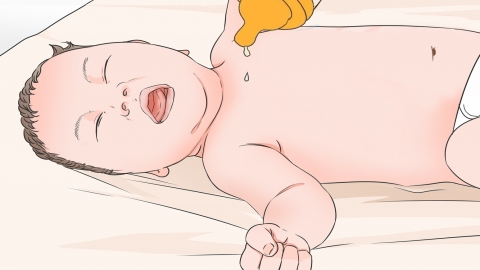What should I do if my baby doesn't like eating?
An infant's lack of interest in eating may be caused by physiological anorexia, teething, indigestion, deficiency of trace elements, intestinal parasitic infection, and other pathological factors. Usually, treatment can be achieved through dietary adjustments, increasing varieties of complementary foods, supplementing trace elements, medication, medical examinations, and other methods. A detailed analysis is as follows:

1. Physiological anorexia: During development, infants may experience a period of physiological anorexia, which is due to a slowing of their growth rate and a reduced need for food. Parents are advised to adjust the infant's diet, increase the variety and texture of complementary foods, to stimulate appetite.
2. Teething: During the teething phase, infants might have reduced appetite due to oral discomfort. At this time, the infant may refuse to eat because of pain or discomfort. Parents can provide the infant with teething biscuits or soft foods to relieve oral discomfort, while maintaining good oral hygiene.
3. Indigestion: An infant's digestive system is not fully developed and is prone to indigestion. Indigestion can cause a decreased appetite and a reluctance to eat, possibly accompanied by symptoms such as bloating, constipation, or diarrhea. Parents should adjust the infant's diet, avoid overfeeding or feeding difficult-to-digest foods, and may, under medical guidance, use probiotics or digestive enzymes such as Lactobacillus tablets, compound pancreatin powder, or multienzyme tablets as adjunctive therapy.
4. Deficiency of trace elements: A deficiency in trace elements such as zinc and iron can affect an infant's appetite and growth and development. When infants lack these trace elements, they may experience symptoms such as poor appetite, food selectivity, and picky eating. Parents are advised to take their infant for trace element testing and supplement the corresponding trace elements appropriately based on test results.
5. Intestinal parasitic infection: Intestinal parasites can cause symptoms in infants such as abdominal pain, diarrhea, and loss of appetite. At this time, the infant may refuse to eat due to physical discomfort. The main treatment involves using anthelmintic medications such as albendazole tablets, pyrantel pamoate tablets, vermifuge and digestive tablets, etc., under medical guidance, while maintaining proper dietary and personal hygiene for the infant.
In daily life, parents should pay attention to the infant's eating habits and growth and development, arrange meals reasonably, diversify complementary foods and textures, and maintain good dietary and personal hygiene for the infant.






